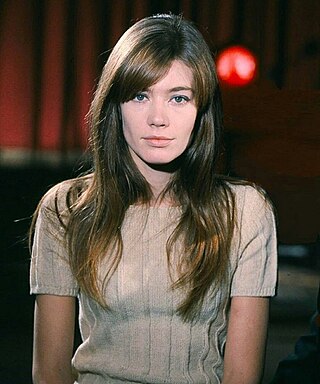
Françoise Madeleine Hardy was a French singer-songwriter and actress. Mainly known for singing melancholic sentimental ballads, Hardy rose to prominence in the early 1960s as a leading figure of the yé-yé wave and became a cultural icon in France and internationally. In addition to her native French, she also sang in English, Italian, and German. Her musical career spanned more than 50 years, with over 30 studio albums released.
Yé-yé or yeyé was a style of pop music that emerged in Western and Southern Europe in the early 1960s. The French term yé-yé was derived from the English "yeah! yeah!", popularized by British beat music bands such as the Beatles. The style expanded worldwide as the result of the success of figures such as French singer-songwriters Sylvie Vartan, Serge Gainsbourg and Françoise Hardy. Yé-yé was a particular form of counterculture that derived most of its inspiration from British and American rock and roll. Additional stylistic elements of yé-yé song composition include baroque, exotica, pop, jazz and the French chanson.
The Grand Prix du Disque for French Song is one of a number of prizes awarded by L'Académie Charles Cros as part of the yearly Grand Prix du Disque. The following is a partial list of winners :

"L'amour s'en va" is a song composed, written, and performed by French singer-songwriter and actress Françoise Hardy. It represented Monaco in the Eurovision Song Contest 1963, she recorded it in other languages, gained chart success in Belgium, won France's prestigious award Grand Prix du Disque, and over time it has become one of Hardy's signature songs.
Disques Vogue was a jazz record company founded in France by Léon Cabat and Charles Delaunay in 1947, the year after the American Vogue label ceased.

"Mon amie la rose" is a poem written by Cécile Caulier and Jacques Lacome, originally performed in song by French singer Françoise Hardy in 1964. It became one of Hardy's most popular songs, and was collected on her album Mon amie la rose.
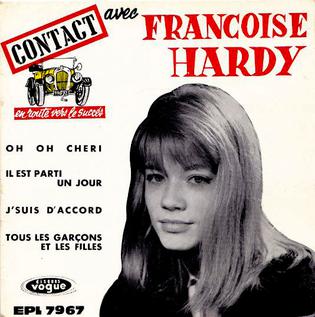
"Tous les garçons et les filles" is a song by French singer-songwriter Françoise Hardy, with Roger Samyn credited as co-writer on Hardy's original 1962 yé-yé-era recording. The song recounts the feelings of a young person who has never known love and her envy of the couples that surround her. Hardy's single, released internationally, was a massive hit in France, where it spent 15 non-consecutive weeks at number one between late October 1962 and mid-April 1963.
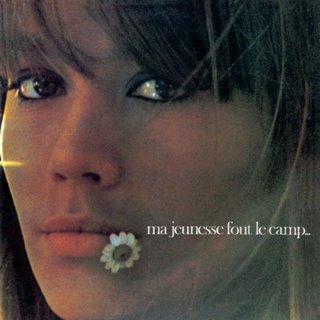
Ma jeunesse fout le camp... is the seventh studio album by French singer-songwriter Françoise Hardy, released in November 1967 on Disques Vogue. The title is very idiomatic, but it in English its general meaning is 'My youth is slipping away'.

Françoise Hardy is the second studio album of the French popular singer Françoise Hardy, released in October 1963 on LP by French label Disques Vogue. She was accompanied by the Marcel Hendrix Orchestra. Like Hardy's previous album, the album was released with no title, except for her name on the cover; as such, album colloquially become known by the title of its most successful song, "Le Premier Bonheur du jour".

Mon amie la rose is a studio album by the French popular singer Françoise Hardy, released in France in November 1964 on LP Disques Vogue. Published without a title except for her name on the cover this album has colloquially become known by the title of its most successful song, "Mon amie la rose".
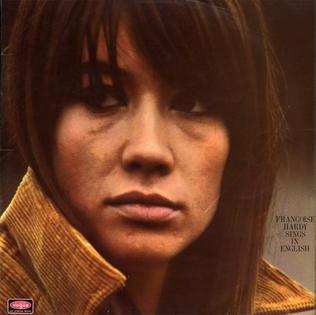
Françoise Hardy Sings in English is a studio album of the French popular singer Françoise Hardy. It was released in United Kingdom in early September 1966, on LP, disques Vogue/Vogue international industries, and in France, in the last week of the same month, on entitled LP, In English, disques Vogue/Vogue international industries.

L'amitié is the fifth studio album by French singer-songwriter Françoise Hardy, released in November 1965 on Disques Vogue. Like many of her previous records, it was originally released without a title and came to be referred to, later on, by the name of its most popular song. The album includes several French adaptations of English-language songs, along with Hardy's own compositions.
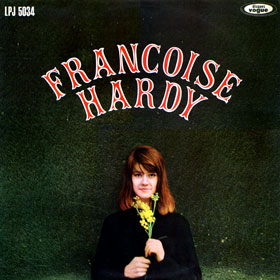
Françoise Hardy canta per voi in italiano is the only Italian-language studio album released into Italy of French popular singer Françoise Hardy. This album was released in November 1963 under label Disques Vogue. The first compact disc appeared in January 2013.

In Deutschland is a 1965 album by the French pop singer Françoise Hardy. It was her first German-language album released in Germany in September 1965, on LP, Bellaphon/Disques Vogue. The 12 songs of this album have been reissued on CD entitled Frag' den Abendwind, in 2001, on RCA/BMG.
"Je ne suis là pour personne" is a song performed by the French pop singer Françoise Hardy. It first appeared on a 1966 Disques Vogue EP with another hit, "La maison où j’ai grandi", catalog number EPL 8427.
Salut les copains is a series of albums released through Universal Music France to commemorate the best of music featured in French scene as sponsored by the "Salut les copains" radio program in France and the French Salut les copains magazine. The tracks include French original singles, French-language covers of known hits as well as European and American hits popular in France. The track list is a representative wide selection of the "Yé-yé" generation of French music.
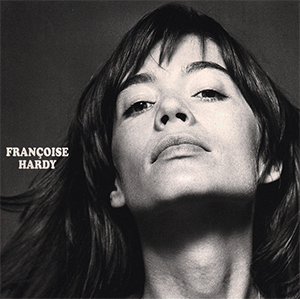
La question is the eleventh studio album by French singer-songwriter Françoise Hardy, released in October 1971 on Sonopresse. Like many of her previous records, it was originally released without a title and came to be referred to, later on, by the name of its most popular song. It is her second album produced under Hypopotam, a production company she established in 1970. The music on the album was almost entirely composed by the Brazilian musician Tuca, who supervised the project and participated as a guitarist.

"All Over the World" is a 1965 song by the French singer Françoise Hardy.

This is the discography of French singer Françoise Hardy.













